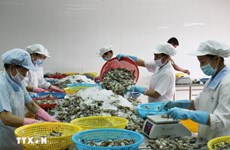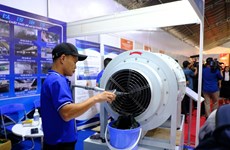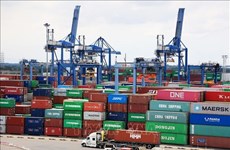Hanoi should develop social housing
Prime Minister Nguyen Tan Dung on December 19 advised Hanoi to
mobilise resources to develop social housing and housing for people who
rendered services to the country, as well as workers, students and civil
servants.
Prime Minister Nguyen Tan Dung on December 19 advised Hanoi to
mobilise resources to develop social housing and housing for people who
rendered services to the country, as well as workers, students and civil
servants.
Dung gave the advice at a working session with city authorities to discuss how to tackle bad debt and solve problems in the property market.
The session was attended by Deputy Prime Ministers Vu Van Ninh and Hoang Trung Hai, as well as leaders of related ministries.
Reports from property investors and traders indicate that Hanoi has 5,800 unsold apartments, equivalent to 566,600 square metres of floor space.
They include 330 apartments for people on low incomes that are still receiving orders , reflecting the high demand for housing from people on medium and low incomes.
The meeting heard that bad debt in the property market accounts for 13 percent of banks’ total bad debt.
Chairman of the municipal People’s Committee Nguyen The Thao said the frozen market is a result of overheated development in a period of economic decline and reduced purchasing power.
The hike in house prices was due to speculation, while the State’s role in regulating the market has not been fully employed, Thao said.
Leaders of many ministries, agencies and banks agreed that the massive investment in the property market by enterprises, including those that are inexperienced, is one of the causes of the problematic market.
In addition, excessive investment has been poured into luxury apartments, while housing development programmes for people on low incomes and social policy beneficiaries have been slowly implemented.
According to Thao, the city has identified a range of solutions, including the review of housing supply and demand to restructure the market, policies to stimulate housing demand and create conditions for those in need with access to housing funds and bank loans at low interest rates, and supporting and removing obstacles for property enterprises, especially bad debts.
Minister of Construction Trinh Dinh Dung said there are differences between the Ho Chi Minh City and Hanoi property markets.
They include slower market freeze, fewer but larger scale projects, lower number of small- and medium-sized enterprises involved in the market, less property debt and higher housing prices.
To remove difficulties, he suggested the city should review housing and new urban area development plans, categorise housing and property projects, and halt developments that do not have a cleared site or match localities’ building plans.
The city should adjust the structure of unsold apartments and incomplete projects to meet people’s demand and budget, he added.
According to the minister, it is also necessary to strengthen administrative procedure reforms.
Meanwhile, Finance Minister Vuong Dinh Hue and Natural Resources and Environment Minister Nguyen Minh Quang said that apart from the development and selling of social housing, leasing should be considered.
Speaking highly of Hanoi ’s measures to ease the city’s property market, Dung said Hanoi should build a financial institution to support the market.
He also asked the city to formulate policies that will encourage and stimulate the demand for housing, and ensure people on low incomes are able to buy or rent homes at affordable prices.
The city should strengthen administrative reforms, simplify procedures in property transactions, and enhance the inspection of the implementation of legal documents on land, housing investment and development, and property trading.
Restructuring the products to meet market demand, lowering prices and providing the products direct to people in need are further areas the city should focus on, Dung said.
The PM requested the State Bank of Vietnam to propose suitable measures to offer loans to people in order to buy social housing, as well as deal with bad debt and mortgages.
He also asked ministries, agencies and Hanoi’s authorities to increase the transparency of information regarding the property market, and implement measures to remove obstacles to warm up the market and make it healthier for sustainable development in the coming time.-VNA
Dung gave the advice at a working session with city authorities to discuss how to tackle bad debt and solve problems in the property market.
The session was attended by Deputy Prime Ministers Vu Van Ninh and Hoang Trung Hai, as well as leaders of related ministries.
Reports from property investors and traders indicate that Hanoi has 5,800 unsold apartments, equivalent to 566,600 square metres of floor space.
They include 330 apartments for people on low incomes that are still receiving orders , reflecting the high demand for housing from people on medium and low incomes.
The meeting heard that bad debt in the property market accounts for 13 percent of banks’ total bad debt.
Chairman of the municipal People’s Committee Nguyen The Thao said the frozen market is a result of overheated development in a period of economic decline and reduced purchasing power.
The hike in house prices was due to speculation, while the State’s role in regulating the market has not been fully employed, Thao said.
Leaders of many ministries, agencies and banks agreed that the massive investment in the property market by enterprises, including those that are inexperienced, is one of the causes of the problematic market.
In addition, excessive investment has been poured into luxury apartments, while housing development programmes for people on low incomes and social policy beneficiaries have been slowly implemented.
According to Thao, the city has identified a range of solutions, including the review of housing supply and demand to restructure the market, policies to stimulate housing demand and create conditions for those in need with access to housing funds and bank loans at low interest rates, and supporting and removing obstacles for property enterprises, especially bad debts.
Minister of Construction Trinh Dinh Dung said there are differences between the Ho Chi Minh City and Hanoi property markets.
They include slower market freeze, fewer but larger scale projects, lower number of small- and medium-sized enterprises involved in the market, less property debt and higher housing prices.
To remove difficulties, he suggested the city should review housing and new urban area development plans, categorise housing and property projects, and halt developments that do not have a cleared site or match localities’ building plans.
The city should adjust the structure of unsold apartments and incomplete projects to meet people’s demand and budget, he added.
According to the minister, it is also necessary to strengthen administrative procedure reforms.
Meanwhile, Finance Minister Vuong Dinh Hue and Natural Resources and Environment Minister Nguyen Minh Quang said that apart from the development and selling of social housing, leasing should be considered.
Speaking highly of Hanoi ’s measures to ease the city’s property market, Dung said Hanoi should build a financial institution to support the market.
He also asked the city to formulate policies that will encourage and stimulate the demand for housing, and ensure people on low incomes are able to buy or rent homes at affordable prices.
The city should strengthen administrative reforms, simplify procedures in property transactions, and enhance the inspection of the implementation of legal documents on land, housing investment and development, and property trading.
Restructuring the products to meet market demand, lowering prices and providing the products direct to people in need are further areas the city should focus on, Dung said.
The PM requested the State Bank of Vietnam to propose suitable measures to offer loans to people in order to buy social housing, as well as deal with bad debt and mortgages.
He also asked ministries, agencies and Hanoi’s authorities to increase the transparency of information regarding the property market, and implement measures to remove obstacles to warm up the market and make it healthier for sustainable development in the coming time.-VNA













